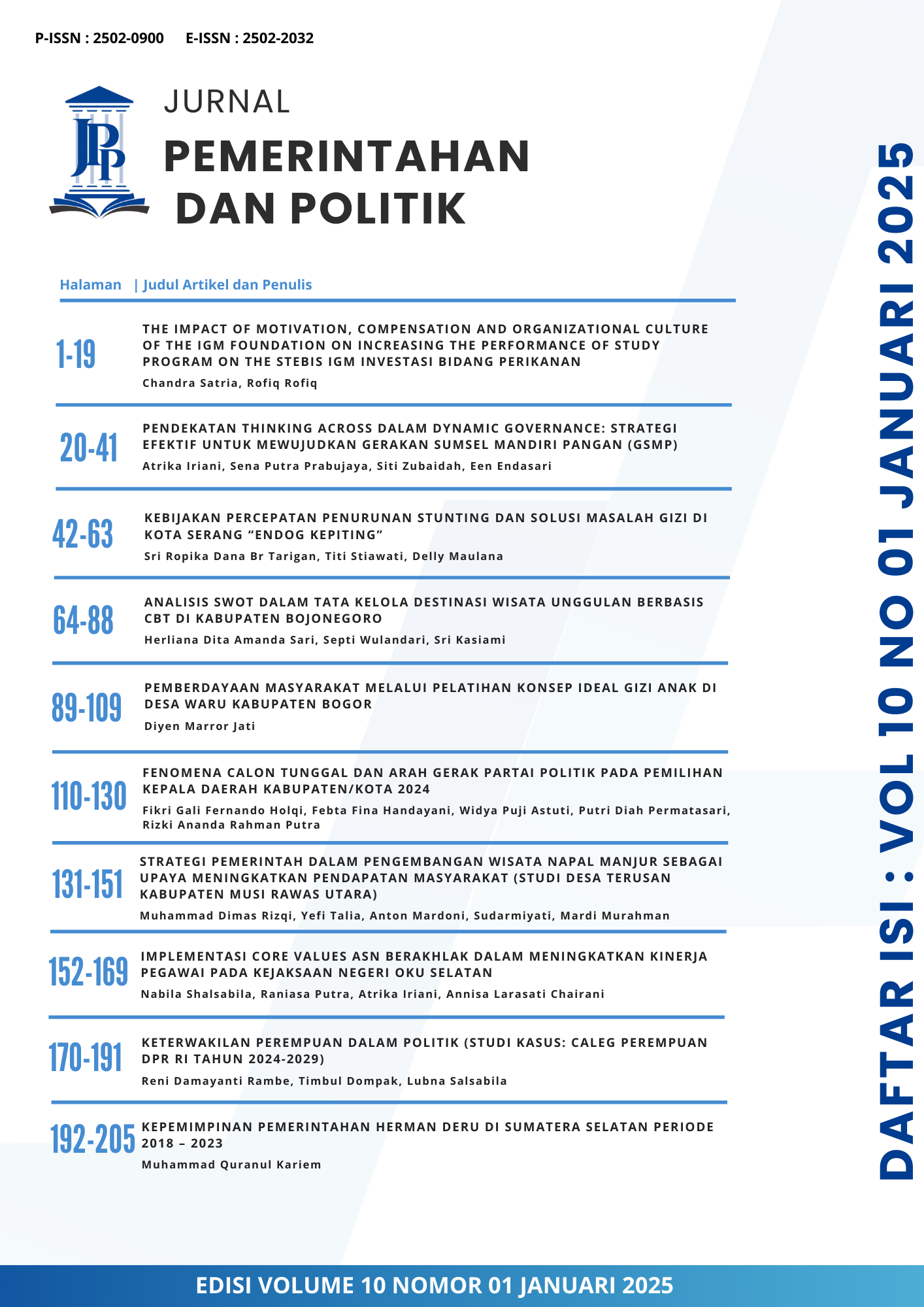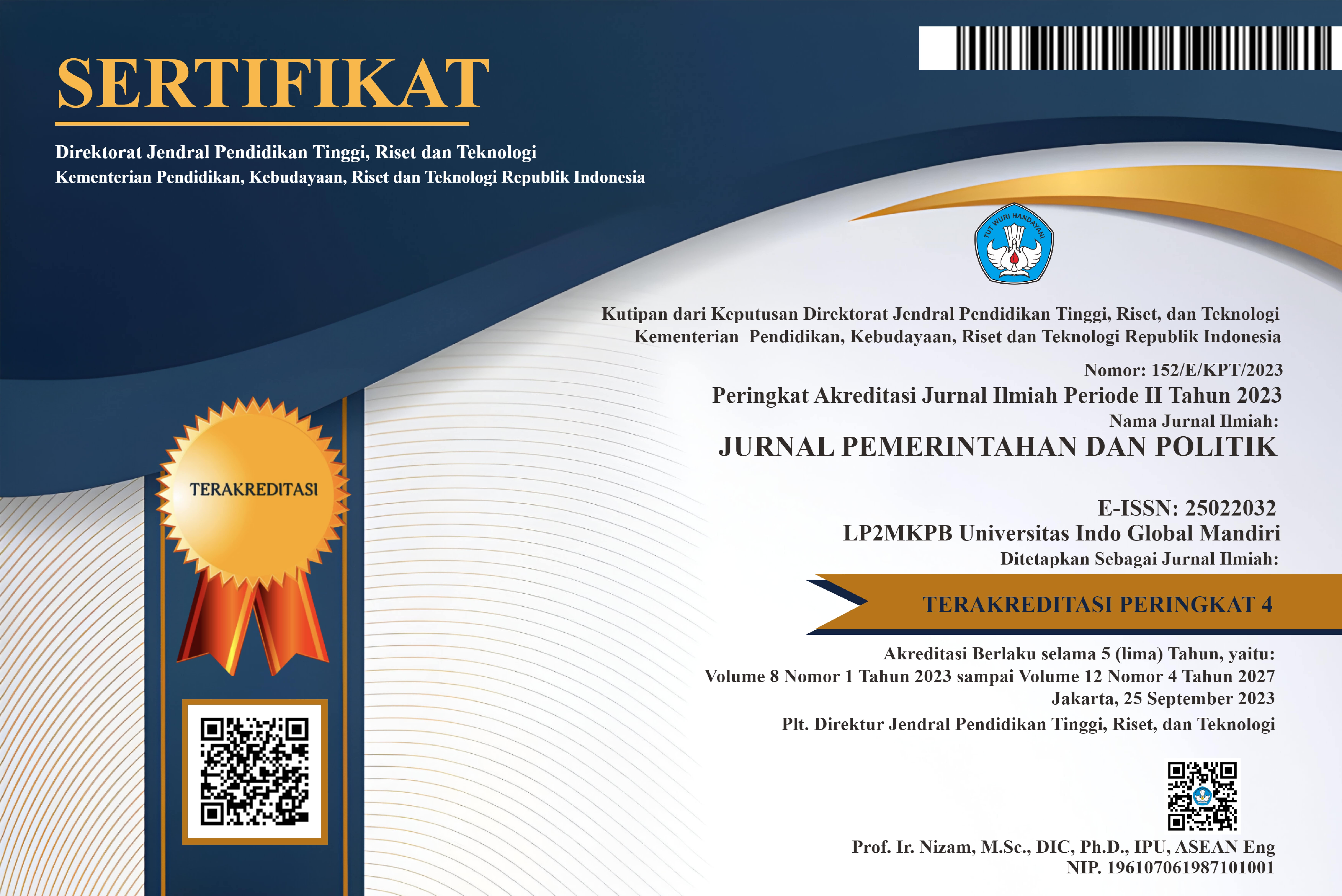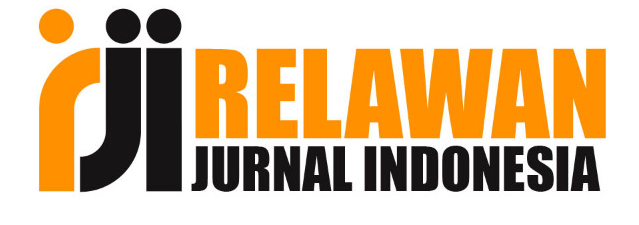Pendekatan Thinking Across dalam Dynamic Governance: Strategi Efektif untuk Mewujudkan Gerakan Sumsel Mandiri Pangan (GSMP)
DOI:
https://doi.org/10.36982/jpp.v10i1.4687Keywords:
Thinking Across, Dynamic Governance, GSMP, Food Resilience, Cross-Sectoral Collaboration, Adaptive GovernanceAbstract
The Sumsel Food Self-Reliance Movement (GSMP) represents a forward-looking initiative by the South Sumatra Provincial Government to achieve sustainable food security through community involvement and local resource optimization. However, its implementation faces persistent challenges, including limited program outreach, insufficient field guidance, and misaligned support services. Leveraging the Thinking Across approach within the Dynamic Governance framework provides a strategic pathway to address these complexities by integrating cross-sectoral collaboration, innovative policy-making, and adaptive governance practices. This qualitative study adopts an exploratory approach, utilizing structured interviews, observations, and document analysis to gather insights from stakeholders involved in GSMP. Data analysis reveals that the Thinking Across approach enhances program effectiveness by promoting synergy between the government, private sectors, and communities. This approach facilitates the integration of diverse perspectives and local knowledge, ensuring the program's adaptability to environmental and socio-economic shifts. Moreover, the approach strengthens community participation and ensures that program interventions align with local needs and capabilities. By embedding cross-disciplinary thinking and dynamic strategies, this study contributes to the theoretical understanding of adaptive governance in the food sector. It recommends bolstering program socialization, increasing targeted field assistance, and fostering data-driven decision-making to maximize GSMP’s impact on food resilience and self-reliance.
References
Aditya, R. B., & Zakiah, A. (2022). Practical Reflection and Benefits of Making a Food Garden at Home During Covid-19 Pandemic. International Journal of Food Studies, 11(1), 85–97. https://doi.org/10.7455/ijfs/11.1.2022.a8
Akhmaddhian, S., & Hartiwiningsih, H. (2018). The public participation in water conservation to embody food security in Kuningan, Indonesia. International Journal of Civil Engineering and Technology, 9(4), 254–264. https://www.scopus.com/inward/record.uri?eid=2-s2.0-85046351509&partnerID=40&md5=268727f08c40a65ffec3dfcc8390189a
Alonso, C. (2015). Artistic practices, discursive contexts and environmental humanities in the age of the anthropocene. Artnodes, 2015(15), 81–89. https://doi.org/10.7238/a.v0i15.2579
Anthony, S., Iriani, A., & Nofrima, S. (2024). Dynamic Governance in the Thinking Ahead Dimension: Perspectives on the Implementation of the South Sumatra Mandiri Food Movement Program. GOVERNABILITAS (Jurnal Ilmu Pemerintahan Semesta), 5(1), 23–36. https://doi.org/10.47431/governabilitas.v5i1.398
Basseches, M. (1986). Comments on social cognition in adulthood: A dialectical perspective. Educational Gerontology, 12(4), 327–334. https://doi.org/10.1080/0380127860120407
Basuki, N. (2023). Mengoptimalkan Modal Manusia : Strategi Manajemen Sumber Daya Manusia Yang Efektif Untuk. Jurnal Ilmiah Manajemen, 4(2), 182–192.
Birkmann, J., Garschagen, M., & Setiadi, N. (2014). New challenges for adaptive urban governance in highly dynamic environments: Revisiting planning systems and tools for adaptive and strategic planning. Urban Climate, 7, 115–133. https://doi.org/10.1016/j.uclim.2014.01.006
Buchtel, E. E., & Norenzayan, A. (2012). Thinking Across cultures: Implications for dual processes. In Two Minds: Dual Processes and Beyond, 217–238. https://doi.org/10.1093/acprof:oso/9780199230167.003.0010
Djelic, Marie-Laure, K. S.-A. (2021). Institutional dynamics of regulation Marie-Laure Djelic and Kerstin Sahlin-Andersson. Interactions, 1–38.
Entwistle, N. (2005). Learning outcomes and ways of Thinking Across contrasting disciplines and settings in higher education. Curriculum Journal, 16(1), 67–82. https://doi.org/10.1080/0958517042000336818
Evans, D. (2004). Shifting the balance of power?: UK public health policy and capacity building. Critical Public Health, 14(1), 63–75. https://doi.org/10.1080/09553000310001658789
Faircloth, C., & Gürtin, Z. B. (2018). Fertile Connections: Thinking Across Assisted Reproductive Technologies and Parenting Culture Studies. Sociology, 52(5), 983–1000. https://doi.org/10.1177/0038038517696219
Fang, Z., Jung, W. H., Korczykowski, M., Luo, L., Prehn, K., Xu, S., Detre, J. A., Kable, J. W., Robertson, D. C., & Rao, H. (2017). Post-conventional moral reasoning is associated with increased ventral striatal activity at rest and during task. Scientific Reports, 7(1). https://doi.org/10.1038/s41598-017-07115-w
Flood management and nature-can rewilding help? (2016). Ecos, 37(1), 32–42. https://www.scopus.com/inward/record.uri?eid=2-s2.0-85029456852&partnerID=40&md5=7b990d952e94449e8696cfee4f1195e8
Galaz, V., & Duit, A. (2008). Governance and Complexity--Emerging Issues for Governance Theory. Governance, 21(3), 311–335.
Gray, S. A. O., Jones, C. W., Theall, K. P., Glackin, E., & Drury, S. S. (2017). Thinking Across Generations: Unique Contributions of Maternal Early Life and Prenatal Stress to Infant Physiology. Journal of the American Academy of Child and Adolescent Psychiatry, 56(11), 922–929. https://doi.org/10.1016/j.jaac.2017.09.001
Gulbrandsen, L. H. (2014). Dynamic Governance interactions: Evolutionary effects of state responses to non-state certification programs. Regulation and Governance, 8(1), 74–92. https://doi.org/10.1111/rego.12005
Idrus, I. A., Suryono, A., Noor, I., & Amin, F. (2023). Education Policy Innovation in Dynamic Governance Perspective in North Luwu District Education Programs. Social Science Journal, 13. https://resmilitaris.net/menu-script/index.php/resmilitaris/article/view/2366
Irish, M., Addis, D. R., Hodges, J. R., & Piguet, O. (2012). Considering the role of semantic memory in episodic future thinking: Evidence from semantic dementia. Brain, 135(7), 2178–2191. https://doi.org/10.1093/brain/aws119
Jackson, L., & Sojot, A. N. (2023). So much more than research: Learning from women leaders in philosophy of education. Educational Philosophy and Theory, 55(9), 1006–1015. https://doi.org/10.1080/00131857.2022.2106851
Juchem Neto, J. P., & Delamare, A. F. S. (2021). The level of tolerance of individuals, individual thinking, and the formation of social norms. Journal of Computational Social Science, 4(2), 721–759. https://doi.org/10.1007/s42001-021-00106-y
Kencana, N., Putra, R., & Permatasari, Y. (2024). Kebijakan Pemerintah Kota Palembang melalui Sister City: Tantangan dan Hambatan. Jurnal Pemerintahan dan Politik, 9(4), 323–330.
Khairul Fahmi Purba, Muhammad Yazid, Mery Hasmeda, Dessy Adriani, M. F. T. (2021). The Sustainability ff Rice Farming Practices in Tidal Swamplands Of South Sumatra Indonesia. Potravinarstvo Slovak Journal of Food Sciences Potravinarstvo, 15(November 2020), 9–17.
Lane, D., & Sorby, S. (2022). Bridging the gap: blending spatial skills instruction into a technology teacher preparation programme. International Journal of Technology and Design Education, 32(4), 2195–2215. https://doi.org/10.1007/s10798-021-09691-5
MacFall, J., Lelekacs, J. M., LeVasseur, T., Moore, S., & Walker, J. (2015). Toward resilient food systems through increased agricultural diversity and local sourcing in the Carolinas. Journal of Environmental Studies and Sciences, 5(4), 608–622. https://doi.org/10.1007/s13412-015-0321-1
MacLachlan, M., & Scherer, M. J. (2018). Systems thinking for assistive technology: a commentary on the GREAT summit. Disability and Rehabilitation: Assistive Technology, 13(5), 492–496. https://doi.org/10.1080/17483107.2018.1472306
Markell, D. L., & Glicksman, R. L. (2016). Dynamic Governance in Theory and Application, Part I. SSRN Electronic Journal, 791. https://doi.org/10.2139/ssrn.2734304
Nadal, A., & Nazar-Beutelspacher, D. A. (2023). COVID-19: Solidarity initiatives for food security in the Mayan indigenous region of south-southeast Mexico. Global Food Security, 37. https://doi.org/10.1016/j.gfs.2023.100697
Naami, M. A., & Maemunah, M. (2024). Efektivitas Program Sibakul Jogja dalam Pemberdayaan Mitra UMKM di Yogyakarta. Jurnal Pemerintahan dan Politik, 9(3), 212–219.
Natsir, N., Halim, R., & Tahili, M. H. (2023). THE EFFECT OF DYNAMIC GOVERNANCE ON PUBLIC SERVICE INNOVATION THROUGH THE RECRUITMENT OF MANAGERS OF PUBLIC ORGANIZATIONS. Public Policy and Administration, 22(4), 405–417. https://doi.org/10.13165/VPA-23-22-4-02
Oh, I. (2010). Virtual technology marketing and governance problems: How can firms benefit from dynamic boundaries? International Journal of Technology Marketing, 5(2), 111–126. https://doi.org/10.1504/IJTMKT.2010.035692
Palanica, A., Lyons, A., Cooper, M., Lee, A., & Fossat, Y. (2019). A comparison of nature and urban environments on creative Thinking Across different levels of reality. Journal of Environmental Psychology, 63, 44–51. https://doi.org/10.1016/j.jenvp.2019.04.006
Peacock, M., Bissell, P., & Owen, J. (2014). Dependency denied: Health inequalities in the neo-liberal era. Social Science and Medicine, 118(C), 173–180. https://doi.org/10.1016/j.socscimed.2014.08.006
Peraturan Pemerintah Republik Indonesia Nomor 19 Tahun 2005 Standar Nasional Pendidikan. 16 Mei 2005. Lembaran Negara Republik Indonesia Tahun 2005 Nomor 41. Jakarta.
Potter, L. (2018). How can the people’s sovereignty be achieved in the oil palm sector? Is the plantation model shifting in favour of smallholders? Land and Development in Indonesia, 315–342. https://doi.org/10.1355/9789814762106-019
Pritchard, J., & Baillie, C. (2006). How can engineering education contribute to a sustainable future? International Journal of Phytoremediation, 31(5), 555–565. https://doi.org/10.1080/03043790600797350
Raak, R. van. (2017). Transition policies:Connecting System Dynamics, Governance and Instruments in an Application to Dutch Healthcare. In Young people and contradictions of inclusion. https://doi.org/10.2307/j.ctt1t894p0.9
Rivki, M., Bachtiar, A. M., Informatika, T., Teknik, F., & Indonesia, U. K. (2017). Ensuring Food Security and Reducing Poverty through Gender on Development: Indonesian Case. Journal of Business and Economic Studies, 112.
Salsabila, L., Ariany, R., & Koeswara, H. (2024). Fostering Community-Led Waste Management Through Dynamic Governance: A Case Study of Batam City. Jurnal Bina Praja, 16(1), 187–200. https://doi.org/10.21787/jbp.16.2024.187-200
Sands, C., Duran, N., Christoph, L., & Stewart, C. (2018). Phoenix Rising: The Evolution of Holyoke’s Collaborative Organizing for Healthy Food Resilience. Health Promotion Practice, 19(1_suppl), 63S-69S. https://doi.org/10.1177/1524839918788849
Schoon, M., York, A., Sullivan, A., & Baggio, J. (2017). The emergence of an environmental governance network: the case of the Arizona borderlands. Regional Environmental Change, 17(3), 677–689. https://doi.org/10.1007/s10113-016-1060-x
Seminar, A., Sarwoprasodjo, S., & Kinseng, R. (2018). Peasant Understanding of Food Sovereignty: Indonesian Peasants in a Transnational Agrarian Movement. Makara Human Behavior Studies in Asia, 22(2), 129. https://doi.org/10.7454/hubs.asia.1250918
Siborutorop, J. (2023). Analysis of Indonesia’s National Food Estate Programme from a Food Sovereignty-based Perspective. Jurnal Politik Indonesia (Indonesian Journal of Politics), 9(2), 92–102. https://doi.org/10.20473/jpi.v9i2.44430
Smith, M. K., Walsh, C., Holmes, N. G., & Summers, M. M. (2019). Using the Ecology and Evolution-Measuring Achievement and Progression in Science assessment to measure student Thinking Across the Four-Dimensional Ecology Education framework. Ecosphere, 10(9). https://doi.org/10.1002/ecs2.2873
Thompson, C. (2011). Critical Thinking Across the Curriculum: Process over Output. International Journal of Humanities and Social Science, 1(9), p4.
Voß, J.-P. (2007). Designs on governance. In Development.
Wanto, H. S. (2023). Sustainable agricultural policy strategy through increasing food crop productivity in Indonesia. Bulgarian Journal of Agricultural Science, 29(2), 223–228. https://www.scopus.com/inward/record.uri?eid=2-s2.0-85160030864&partnerID=40&md5=da23ae19614c2e0d95078ba9a2e4776b
Merna T. dan F. F. Al-Thani. 2008. Corporate Risk Management. 2nd ed. John Welly and Sons Ltd. England.
Samsi, N. 2012. Pengaruh Pengalaman Kerja, Independensi, dan Kompetensi terhadap Kualitas Hasil Pemeriksaan dengan kepatuhan Etika Auditor sebagai Variabel Pemoderasi. Tesis. Program S2 Akuntansi Sekolah Tinggi Ilmu Ekonomi Indonesia (STIESIA). Surabaya.









